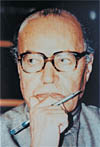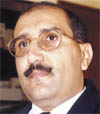Salah Al-Ajam: “Differences between Yemen and Saudi Arabia on the border issue are not insurmountable.” [Archives:1998/09/Interview]
Sheikh Salah Al-Ajam is a member of the Consultative Council’s political Committee. Hailing from Matabish, Saada, Al-Ajam, 61, occupied several important posts including member of the Shourah Council in 1971, member of the Cooperatives Administrative Authority in 1975, member of the People’s Council in 1978, Secretary-General of the Local Councils in Saada in 1980, again in the Shourah Council in 1988, and governor of Lahaj.
Sheikh Al-Ajam talked to Dr. Salah Haddash, Yemen Times Managing Editor, about the concerns of the people of Saada and the country in general. The fruit of their conversation is the following enlightening interview. Excerpts:
Q: What has the Political Committee of the Consultative Council been able to achieve so far?
A: The Political Committee has the largest number of members among the Consultative Council’s other committees. We are currently in the process of drawing out an action plan and an annual program. It is all to make the Consultative Council more active, politically.
During the last couple of months, we held meetings with a number of ambassadors and officials to acquaint them with the political activities of the Consultative Council.
Q: Do you have any links with your counterparts in other Arab countries?
A: Yes, it is very important to get to know about the experiences of similar assemblies in other Arab countries. A Consultative Council delegation had already visited Jordan’s upper house or Council of Notables. Similar visits are planned to Egypt’s Shourah Council and Morocco’s Council of Notables. We are basically trying to benefit from the experiences of others and present to them our own endeavors.
Q: There seems to be slow progress made by your committee. why is that?
A: This is true to a certain extent because our committee’s President, Mr. Yahya AL-Mutawakkil had a spinal injury and had to stay away from work for the last three months. Also, the committee rapporteur, Mr. Ahmed Al-Salami is abroad for medical treatment. We are now starting our activities in earnest, with all the members present.
Q: You are also a member of the Yemeni border committee. What has this committee achieved so far?
A: A lot has been achieved, actually. We are still looking for common grounds for the starting point of the border with Saudi Arabia at Ras Mi’waj in the Red Sea. Our main task is in the western region, which starts at Ras Mi’waj and ends with Mount Thaar.
All the committee members made field visits to see the border area and exchange opinions. An agreement was reached in the last meeting in Aden that the committee’s president would make the necessary contacts to set a date for a meeting with our Saudi counterparts.
Q: Are you optimistic of reaching a satisfactory resolution for the border conflict with Saudi Arabia?
A: Let me tell you something. There is no real conflict. The differences between the two sides are not very big. They are certainly not insurmountable. So as far as our work in the western region is concerned, yes, I am very optimistic. We are proceeding with the implementation of what had been agreed on in the memorandum of understanding.
Q: Could you now tell us about Saada, its people and their problems and needs?
A: Well, Saada has a population of around 480,000. As a border governorate, Saada is acquiring an added importance. Our most pressing problem is water. People used to drill 30 m deep, find water, and operate the well for 24 hours a day. Now we have to drill to a depth of 300 m looking for water. Some wells are already going dry and a few farms were abandoned for lack of water.
Studies made by Dutch experts indicate that underground water is now almost 400 m deep, and its level is dropping threateningly. Rain water is not replenishing the aquifers fast enough. Life in Saada is closely associated with agriculture. If that ceases because of lack of water for irrigation, then all life in Saada is finished. People are using simple man-made reservoirs to store rain water until the following season. There are three small dams in Saada.
Another problem is that of electricity. The region is not fully electrified. The government is providing us with 3 MW electric generators that will supply the whole of Saada. There remains the President’s directive to extend the electricity network to six more directorates in the governorate of Saada. The necessary cables and other equipment will be imported soon.
Q: What about paved roads? How available are they?
A: The most important road in Saada is the ring road which connects six directorates together. More roads and bridges are needed to make few remote areas more accessible. The Minister of Construction will visit the area soon to assess the situation on the ground.
Q: Are health and education services available for are people in the governorate?
A: There are enough schools, buy the level of education is not that good. Better qualified teachers are needed. Sometimes secondary-school graduates are appointed to teach at secondary schools. Even university graduates must finish some sort of course to be able to teach. So really the education system in Saada is in urgent need of reform.
Female education is on the increase because young girls are now more encouraged to go to schools and there are also more schools being opened for girls throughout Saada.
Health care services, on the other hand, are generally below par. The Jumhoori Hospital in Saada, for instance, needs a lot of support in terms of funds, equipment and qualified staff. There is also Al-Salam Hospital which was built with Saudi funds. Smaller health centers exist in several Saada directorates, but they are in great need of staffing.
Q: Is Saada still the gateway of Yemeni immigrants into Saudi Arabia?
A: Immigration into Saudi Arabia is far less than it was before because of this new regulations and restrictions.
Q: How is the state of agriculture now in Saada?
A: This season in particular, the crop yield is down and the prices, especially of fruits such as oranges, grapes, and tangerines, are quite less than normal.
Q: What about the smuggling of goods into or from Saudi Arabia? Is it still prevalent?
A: This was so in the past. Smuggling is now no longer lucrative. The legal imports of canned and processed food and the export of fruits and vegetables are more profitable for people now.
Q: Could you tell us the extent of the problem of blood revenge in Saada?
A: I believe Saada is the best governorate in terms of morals and respect of the law and order. You can visit Saada and see for yourself. Crimes of revenge are very rare, indeed.
Q: Do you have any kidnapping incidents, of foreigners?
A: It only happened once – a European man was abducted and released on the same day. This is also attributable to the high moral standards of the people. It is considered quite immoral to force a person against his will to become a “guest.” People in Saada are far from being aggressive and refrain from making ill-gains. Besides, they are quite busy tending to their farms and trades.
Q: Are there any extremist Islamic groups in Saada, as is often rumored?
A: Saada is very quiet. There are people who belong to different Islamic sects such as the Zaydi or Sunni who might differ slightly in their viewpoints, but never to the point of extremism. They respect each others opinions and never resort to violence to settle their differences.
Saada is known for the prevalence of the Zaydi sect. The Sunni people largely came after the September Revolution. They are very decent and rational people. We never have sectarian trouble.
Q: Do Saada women play a major role in public life?
A: During the last parliamentary elections and the registration procedure which preceded it, many women, even in remote rural areas, actively took part. The level of awareness among women in Saada is quite amazing. Now the people, men and women are re-preparing for the local elections.
Q: Are all political parties represented in Saada?
A: Political plurality do exist in Saada. The People’s General Congress, Islah, the Socialist Party, Al-Haqq, AL-Baath, and the Nasserites are all active in Saada. The influence and representation, however, differ from one party to another.
——
[archive-e:09-v:1998-y:1998-d:1998-03-02-p:./1998/iss09/intrview.htm]


